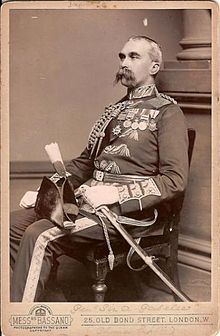Alfred Gaselee
| Sir Alfred Gaselee | |
|---|---|

Sir Alfred Gaselee
|
|
| Born | 3 June 1844 |
| Died | 29 March 1918 (aged 73) |
| Allegiance |
|
| Service/branch |
|
| Years of service | 1863–1908 |
| Rank | General |
| Commands held | 1st Bn 5th Gurkha Rifles Northern Army, India |
| Battles/wars |
Second Anglo-Afghan War Boxer Uprising |
| Awards |
Knight Grand Cross of the Order of the Bath Knight Grand Cross of the Order of the Indian Empire |
General Sir Alfred Gaselee, GCB, GCIE, (3 June 1844 – 29 March 1918) was a soldier who served in the Indian Army.
Gaselee was born at Little Yeldham, Essex, the eldest son of the Reverend John Gaselee, rector of Little Yeldham, and his wife, Sarah Anne Mant. He entered Felsted School in 1853 and the Royal Military College, Sandhurst, in 1861.
Gaselee was commissioned as an ensign into the 93rd regiment (later the Sutherland Highlanders) on 9 January 1863. He was involved in the campaign on the North-West Frontier of India in that year. He was promoted lieutenant on 11 October 1866, transferred to the Bengal staff corps, and joined the 4th Punjab infantry on 27 September 1867.
Gaselee went with the Indian force to Abyssinia, where he acted as assistant to the director-general of transport and was present at the capture of Magdala (13 April 1868). He was promoted captain on 9 January 1875, and served with the Jowaki expedition of 1877–8.
In the Second Anglo-Afghan War, Gaselee was a deputy assistant quartermaster-general, and accompanied Lord Roberts on the march from Kabul to the relief of Kandahar. He was made a brevetted major on 2 March 1881.
...
Wikipedia
